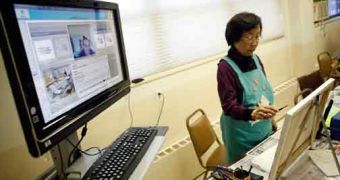For some, Windows 7 might just be the fastest selling operating system in history, but, for others, the product could prove a veritable life saver. The successor of Windows Vista is at the core of a new initiative aimed at homebound seniors, and designed to boost wellness by simply helping them reduce social isolation. Virtual Senior Center is only a demonstration project at this point in time, but there has to be little doubt that a product based on this concept will deliver quality-of-life benefits to seniors who are prisoners of their homes because of age-related health problems.
Together with the City of New York and Selfhelp Community Services, Microsoft has already started the Virtual Senior Center demonstration project involving no less than six participants, the oldest of which is 103. Of course, as a general rule, the Redmond company will base all solutions to problems social or otherwise on technology. The Virtual Senior Center is no exception to this rule, and, in addition to the Windows 7 computer equipped with a touch-screen monitor that comes with a webcam, the microphone simplifies communication with a broadband Internet service. Windows 7 is especially helpful in the case of seniors with age-related impairments, who can benefit from the built-in assistive technology that the operating system offers.
“Even in a large and vibrant city like New York, people can feel isolated and alone,” Bonnie Kearney, director of Marketing for Trustworthy Computing at Microsoft, revealed. “At Microsoft, we work with governments, technology partners and nonprofit organizations around the world to create inclusive communities that welcome people because of their abilities rather than excluding them, even inadvertently, because of their disabilities. One way we help make that possible is by continually developing accessible technology that is safer and easier to use.”
Because of its default accessibility features and natural user interface, Windows 7 is an excellent solution for people that lack the basic skills to otherwise use a computer, or that are unable to do so because of physical impairments. In the particular case of the Virtual Senior Center initiative, technology can easily help homebound seniors, at least two million in the US, to make the autumn of their lives enjoyable.
“As personal computers and the Internet become increasingly important in our society, many seniors — especially homebound seniors — are being left behind because they don’t have access to technology or an opportunity to learn the necessary skills,” Kearney added. “With the Virtual Senior Center, this innovative public-private partnership is demonstrating a model that other cities can use to help homebound seniors stay connected and keep contributing to their communities.”

 14 DAY TRIAL //
14 DAY TRIAL //